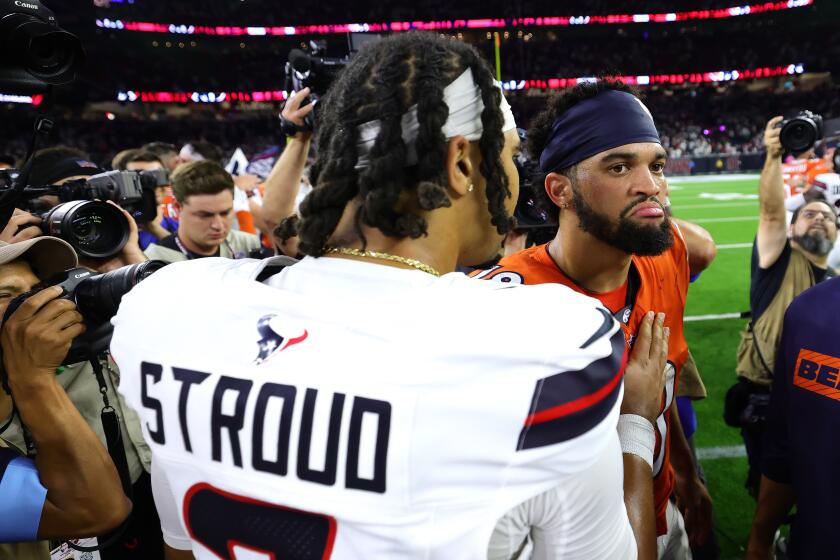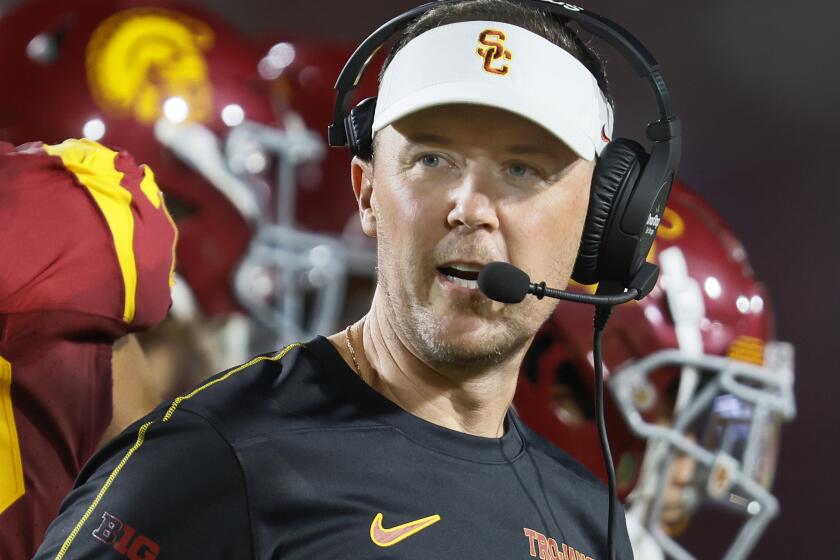ROSE BOWL: MICHIGAN 22, USC 14 : In Final Quarter, Calls on 4th and 1 Separate Michigan From USC
USC Coach Larry Smith went for the 47-yard field goal. It was wide to the right.
Michigan Coach Bo Schembechler spurned the short field goal and went for the touchdown. It was right there.
With that tough-call touchdown, Michigan secured its 22-14 victory over USC Monday in the Rose Bowl.
So this time, Schembechler was all smiles when he was asked to explain his thinking on the key fourth-quarter, fourth-down play.
“You used to call me conservative,” Schembechler chided reporters. “Now I do all these crazy things and you’re still asking me about it.”
Actually, going for the touchdown on fourth and goal at the 1-yard line with just 1:57 to play was not crazy. Not even too much of a gamble.
Michigan was leading, 15-14, at the time, and a good argument could be made for kicking a sure field goal to take a 4-point lead, which would have meant that a field goal couldn’t win it for the Trojans. It would take a touchdown.
But the catch is that the field goal was not a sure thing for the Wolverines. For starters, although Michigan kicker Mike Gillette had a 49-yard field goal in the first quarter, he missed from 34 yards just before the end of the first half, then missed from 22 yards in the third period.
Also, the ball was sitting on the hash marks on the right side of the field. From the 1-yard line, that’s a tricky angle.
Schembechler: “I would have had to take a couple of penalties, and they’d have turned them down.”
Then there’s the gut instinct. Schembechler said he was just sure his Wolverines could get that ball in the end zone.
Then there’s the huddle. His tight ends were telling him that they could handle the Trojans across the line. No problem.
Then there’s the measurement. It wasn’t a long yard. It was a short yard. Maybe 30 inches.
Then the lure of a safe 8-point lead has to be weighed against the consequences of being stopped.
“With the time that was remaining, and since we were that close, we thought we could give the ball to (Leroy) Hoard, and if he didn’t make it--if they could drive well enough to get down there and score, they could have it, they deserved it,” Schembechler said.
Whether USC could drive within field-goal range was a very big “if”, considering that the Trojans weren’t exactly rolling up yardage in the second half. On their 5 possessions before Schembechler faced this decision, USC had run and passed for a total of 78 yards. To reach safe field goal range, the Trojans would have to go about that far in less than 2 minutes.
“It was a coach’s decision all the way, but I thought that we should go for it,” Michigan quarterback Demetrius Brown said. “With all the bickering that was going on on the sideline, not really bickering, but all the discussion, I was just listening to the coach. The tight ends were saying that they could open it up.
“I was glad he made that call. I felt we could move the ball.”
Smith’s decision to let Quin Rodriguez try a 47-yard field goal was not necessarily an indication that he didn’t think his offense could move the ball.
But when he found himself facing fourth and (a long) 1, almost fourth and 2, on the Michigan 30 with 5:28 to play, he had to take note that his team had not scored at all in the second half and was down by just 1 point.
A field goal at that point would have meant the go-ahead points.
Rodriguez had made a 47-yarder earlier this season, at Arizona State. So 47 yards couldn’t be ruled out. According to his statistics (2 for 4 from 40-49 yards), the sophomore had about a 50% chance of putting the Trojans up by 2 points.
“Quin has been kicking extremely well and we thought we’d give him a shot,” Smith said. “The snap was low and we didn’t get it on the tee. That was just one of our mistakes, though. We were just sloppy out there.”
Smith also had to consider momentum, and it was with the Wolverines at that point.
Even if he let his offense go for the first down, there was no reason to believe they would get it. The Trojans’ previous possession had ended in a fumble by quarterback Rodney Peete. Their final possession ended with an interception.
That field goal attempt, long as it was, probably represented the Trojans’ best bet.
Go beyond the scoreboard
Get the latest on L.A.'s teams in the daily Sports Report newsletter.
You may occasionally receive promotional content from the Los Angeles Times.



